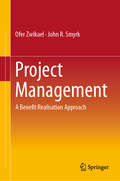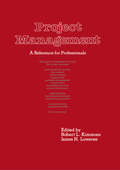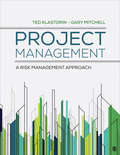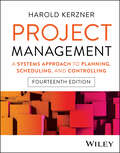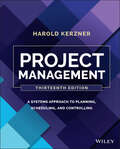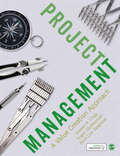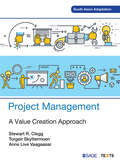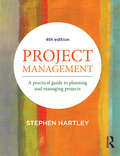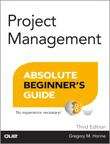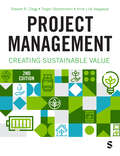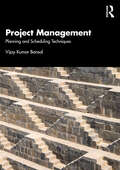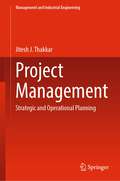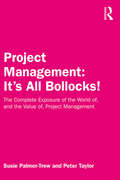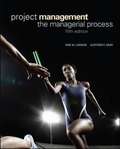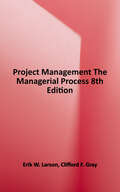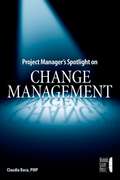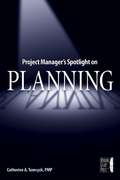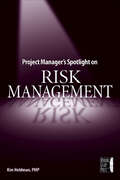- Table View
- List View
Project Management: A Benefit Realisation Approach
by Ofer Zwikael John R. SmyrkThis book is a complete project management toolkit for project leaders in business, research and industry. <P><P> Projects are approved and financed to generate benefits. Project Management: A Benefit Realisation Approach proposes a complete framework that supports this objective – from project selection and definition, through execution, and beyond implementation of deliverables until benefits are secured. <P><P> The book is the first to explain the creation of organisational value by suggesting a complete, internally-consistent and theoretically rigorous benefit-focused project management methodology, supported with an analytical technique: benefit engineering. Benefit engineering offers a practical approach to the design and maintenance of an organisation’s project portfolio. <P><P> Building upon the authors’ earlier successful book, Project Management for the Creation of Organisational Value, this comprehensively revised and expanded new book contains the addition of new chapters on project realisation. The book offers a rigorous explanation of how benefits emerge from a project. This approach is developed and strengthened — resulting in a completely client-oriented view of a project. <P><P> Senior executives, practitioners, students and academics will find in this book a comprehensive guide to the conduct of projects, which includes robust models, a set of consistent principles, an integrated glossary, enabling tools, illustrative examples and case studies.
Project Management: A Managerial Approach (Eighth Edition)
by Jack R. Meredith Samuel J. MantelAs the use of project management to accomplish organisational goals continues to grow, skills related to understanding human behavior, evaluating organisational issues, and using quantitative methods are all necessary for successful project management. Meredith and Mantel have drawn from experiences in the workplace to develop a text that teaches the student how to build skills necessary for selecting, initiating, operating, and controlling all types of projects.
Project Management: A Reference for Professionals
by Kimmons""Highlighting the practical side of real-life project execution, this massive reference stresses project management as an independent profession--detailing the varied applications where project management is used and examining the numerous and diverse project management responsibilities and tools.
Project Management: A Risk-Management Approach
by Gary Mitchell Ted KlastorinAs the number and size of projects continue to increase, there is a growing demand for effective project managers. Project Management: A Risk-Management Approach prepares students to successfully navigate the many challenges, factors, and situations that project managers face. Authors Ted Klastorin and Gary Mitchell emphasize the importance of mitigating risk at every stage, helping students avoid common pitfalls that lead to project failures, compromised schedules, or incurred costs. Real-world examples, cases, solved problems, and practice problems help bring methodologies to life. Readers will be equipped with the tools they need to plan, schedule, and monitor even the most complex projects in a variety of market sectors. Included with this title: The password-protected Instructor Resource Site (formally known as SAGE Edge) offers access to all text-specific resources, including a test bank and editable, chapter-specific PowerPoint® slides.
Project Management: A Risk-Management Approach
by Gary Mitchell Ted KlastorinAs the number and size of projects continue to increase, there is a growing demand for effective project managers. Project Management: A Risk-Management Approach prepares students to successfully navigate the many challenges, factors, and situations that project managers face. Authors Ted Klastorin and Gary Mitchell emphasize the importance of mitigating risk at every stage, helping students avoid common pitfalls that lead to project failures, compromised schedules, or incurred costs. Real-world examples, cases, solved problems, and practice problems help bring methodologies to life. Readers will be equipped with the tools they need to plan, schedule, and monitor even the most complex projects in a variety of market sectors. Included with this title: The password-protected Instructor Resource Site (formally known as SAGE Edge) offers access to all text-specific resources, including a test bank and editable, chapter-specific PowerPoint® slides.
Project Management: A Systems Approach to Planning, Scheduling, and Controlling
by Harold KerznerThe gold standard for project management students and professionals—enhanced with AI, agile, and data-driven strategies in this landmark 14th edition. For over four decades, Project Management: A Systems Approach to Planning, Scheduling, and Controlling has been the go-to resource for project managers, students, and professionals worldwide. In this newly revised 14th edition, renowned project management expert Harold Kerzner integrates the latest advancements, from artificial intelligence (AI) and data-driven decision-making to agile and hybrid methodologies, ensuring today's project leaders are equipped to navigate an evolving landscape. Aligned with the Project Management Body of Knowledge (PMBOK® Guide), this bestselling guide prepares readers for the PMP® exam's principles-first approach. Whether you're leading complex global projects, managing sustainability initiatives, or leveraging AI for project insights, this book provides the tools to drive success. In this new 14th edition, you'll find: Cutting-edge insights on AI in project management, data-driven strategies, and emerging methodologies. Practical frameworks for settting clear objectives, defining project success, and managing risks. Comprehensive guidance on agile, hybrid, and traditional project management approaches. In-depth coverage of sustainability and corporate social responsibility in project execution. Real-world strategies for managing complex, large-scale, and global projects. Ideal for students, PMP® candidates, and practicing professionals, Project Management, 14th Edition remains the gold standard for mastering project management.
Project Management: A Systems Approach to Planning, Scheduling, and Controlling (The\iil/wiley Series In Project Management Ser. #2)
by Harold KerznerPROJECT MANAGEMENT THE NEWEST EDITION OF THE #1 PROJECT MANAGEMENT GUIDE FOR STUDENTS AND PROFESSIONALS In the newly revised 13th Edition of Project Management: A Systems Approach to Planning, Scheduling, and Controlling, project management pioneer, leader, and educator Dr. Harold Kerzner delivers a comprehensive and intuitive approach to project management. Widely known as the bestselling “bible” of project management, this book aligns with the concepts and standards outlined in PMI’s latest A Guide to the Project Management Body of Knowledge, (PMBOK® Guide) and contains the detailed coverage of tools and methods used at all stages of a project. New content added to this 13th Edition includes project health checks, the continued growth of strategic project management, new business models, lean project management, artificial intelligence, and the use of new metrics and KPIs. Supplementary material for academic and corporate instructors, students, and practicing project managers can be found on the book’s companion website. A thorough introduction to project management concepts, like project success definition, the role of the project manager, working with executives, and project classification Comprehensive explorations of the evolution and growth of project management, organizational structures, staffing a project team, and management functions Practical discussions of communications management, conflicts, project planning, network scheduling techniques, and pricing and estimation In-depth examinations of cost control, metrics and KPIs, and risk, contract, and quality management Perfect for students and scholars of project management in business and engineering programs, Project Management: A Systems Approach to Planning, Scheduling, and Controlling will also earn a place in the libraries of anyone studying for the PMP® exam, as well as practicing project managers, project consultants, and trainers.
Project Management: A Value Creation Approach
by Stewart R Clegg Torgeir Skyttermoen Anne Live VaagaasarProject management is an essential life and workplace skill that everyone must develop. Following the popular style and format of other textbooks by Stewart Clegg, this brand new co-authored textbook on project management provides a much needed European perspective to the subject. Drawing on the latest research and practice, the authors guide students on an active learning journey through the project lifespan, promoting a critical and reflexive approach to studying project management, as well as one that creates value for all project stakeholders and emphasizes people and not just process. Case studies and examples discussed in the text cover a wide range of projects from large to smaller across different industries and sectors, both public and private, including: megaprojects (HS2); mega events (Olympics); political projects (Brexit); health-related project implementation (LEAN); tech-related projects (Google); building and restoration projects (housing/Sagrada Familia); and arts and cultural projects (European Capital of Culture). Incorporating a host of learning features both in chapters and via the supporting online resources, this textbook is essential reading for all students/managers completing a course unit in project management at either undergraduate or postgraduate level.
Project Management: A Value Creation Approach
by Stewart R Clegg Torgeir Skyttermoen Anne Live VaagaasarProject management is an essential life and workplace skill that everyone must develop. Following the popular style and format of other textbooks by Stewart Clegg, this brand new co-authored textbook on project management provides a much needed European perspective to the subject. Drawing on the latest research and practice, the authors guide students on an active learning journey through the project lifespan, promoting a critical and reflexive approach to studying project management, as well as one that creates value for all project stakeholders and emphasizes people and not just process. Case studies and examples discussed in the text cover a wide range of projects from large to smaller across different industries and sectors, both public and private, including: megaprojects (HS2); mega events (Olympics); political projects (Brexit); health-related project implementation (LEAN); tech-related projects (Google); building and restoration projects (housing/Sagrada Familia); and arts and cultural projects (European Capital of Culture). Incorporating a host of learning features both in chapters and via the supporting online resources, this textbook is essential reading for all students/managers completing a course unit in project management at either undergraduate or postgraduate level.
Project Management: A Value Creation Approach
by Stewart R. Clegg Torgeir Skyttermoen Anne Live VaagaasarThis adaptation is an invaluable manual on developing the essential life and workplace skill of project management. Project Management: A Value Creation Approach guides its readers through the entire life cycle of a project, from conception to completion. It draws on the latest research and practices to provide a contemporary understanding of the subject that encourages readers to take an active learning journey through the field. The methodology explained in the book puts emphasis on people and not just processes, ensuring an approach that will create value for all stakeholders in a project. It promotes a critical and reflexive outlook to the subject. Key Features: • Includes case studies that discuss a wide variety of projects across different industries • Reflects the current trends in project management • The 'In Practice' feature tests the reader's ability to apply theories to practical situations by using short case studies • Encourages readers to creatively approach problems in project management through the 'What would you do?' feature
Project Management: A practical guide to planning and managing projects
by Stephen HartleyOrganisations increasingly look to project management to deal with short timeframes, tight budgets, changing requirements and risk management in everyday operations, as well as for major strategic projects. Project management knowledge and skills are now essential for professionals just about everywhere, from teachers, social workers and lawyers, to engineers, builders and accountants.Stephen Hartley's Project Management is based on the recognised global standard for project management, the Project Management Body of Knowledge (PMBOK Guide), and it incorporates aspects of Agile, PRINCE2, Lean and other popular methodologies. It offers a thorough overview of the principles of project management, combined with tools and guidelines to manage projects of all sizes, from inception to evaluation.Written in an accessible and engaging style, Stephen Hartley's widely used text has been fully revised and updated. It focuses on shared responsibility, transparent documentation, reporting achievement over activity, and continuous improvement. It is illustrated with examples and case studies, and accompanied by a suite of downloadable templates and tools.'Stephen Hartley is without doubt Australia's leading authority on project management. This book is the bible for any current or future project manager.' - Dr Tim Baker, author of The End of the Performance Review
Project Management: Absolute Beginner's Guide (Third Edition)
by Greg HorineSucceed as a project manager, even if you've never run a project before! This book is the fastest way to master every project management task, from upfront budgeting and scheduling through execution, managing teams through closing projects, and learning from experience. Updated for the latest web-based project management tools and the newest version of PMP certification, this book will show you exactly how to get the job done, one incredibly clear and easy step at a time. Project management has never, ever been this simple! Who knew how simple Project Management could be? This is today's best beginner's guide to modern project management. . . simple, practical instructions for succeeding with every task you'll need to perform! Here's a small sample of what you'll learn: * Master the key skills and qualities every project manager needs * Lead projects, don't just "manage" them * Avoid 15 most common mistakes new project managers make * Learn from troubled, successful, and "recovered" projects * Set the stage for success by effectively defining your project * Build a usable project plan and an accurate work breakdown structure (WBS) * Create budgets and schedules that help you manage risk * Use powerful control and reporting techniques, including earned value management * Smoothly manage project changes, issues, risks, deliverables, and quality * Manage project communications and stakeholder expectations * Organize and lead high-performance project teams * Manage cross-functional, cross-cultural, and virtual projects * Work successfully with vendors and Project Management Offices * Make the most of Microsoft Project and new web-based alternatives * Get started with agile and "critical chain" project management
Project Management: Achieving Competitive Advantage
by Jeffrey K. Pinto<P>Project management has become central to operations in industries as diverse as construction and information technology, architecture and hospitality, and engineering and new product development; therefore, this text simultaneously embraces the general principles of project management while addressing specific examples across the wide assortment of its applications.<P> This text approaches each chapter from the perspective of both the material that is general to all disciplines and project types and that which is more specific to alternative forms of projects. One way this is accomplished is through the use of specific, discipline-based examples to illustrate general principles as well as the inclusion of cases and Project Profiles that focus on more specific topics (e.g., Chapter 5's treatment of IT "death march" projects).
Project Management: Creating Sustainable Value
by Stewart R Clegg Torgeir Skyttermoen Anne Live VaagaasarThe second edition of this comprehensive textbook has been fully revised and updated, streamlining chapters and ensuring accessibility. Sustainability is now at the core of this textbook, showing students how projects can achieve success and create value for all stakeholders, ensuring projects for people, planet and prosperity. Key features of this edition include: • Sustainability Development Goal icons throughout highlighting where topics related to sustainability are covered. • New and expanded coverage of agile approaches, remote working, digitalisation, artificial intelligence and Industry 4.0. • Over 100 case studies from across different industries and countries such as Spain, Denmark, Qatar, Kenya, South Africa, Australia and Brazil. With an array of pedagogical features and complemented by supplementary online resources, this textbook is essential reading for students and managers undertaking a project management course at either the undergraduate or postgraduate level.
Project Management: Creating Sustainable Value
by Stewart R Clegg Torgeir Skyttermoen Anne Live VaagaasarThe second edition of this comprehensive textbook has been fully revised and updated, streamlining chapters and ensuring accessibility. Sustainability is now at the core of this textbook, showing students how projects can achieve success and create value for all stakeholders, ensuring projects for people, planet and prosperity. Key features of this edition include: • Sustainability Development Goal icons throughout highlighting where topics related to sustainability are covered. • New and expanded coverage of agile approaches, remote working, digitalisation, artificial intelligence and Industry 4.0. • Over 100 case studies from across different industries and countries such as Spain, Denmark, Qatar, Kenya, South Africa, Australia and Brazil. With an array of pedagogical features and complemented by supplementary online resources, this textbook is essential reading for students and managers undertaking a project management course at either the undergraduate or postgraduate level.
Project Management: Planning and Scheduling Techniques
by Vijay Kumar BansalProject Management:Planning and Scheduling Techniques is a highly readable guide to the essentials of project planning, scheduling, and control aimed at readers looking for an introduction to the core concepts of planning and scheduling, including the ‘Critical Path Method’, but also the ‘Precedence Diagramming Method’, the ‘Line of Balance’ technique, and the ‘Programme Evaluation and Review Technique’. This book explains the theory behind the methods and makes effective use of learning outcomes, exercises, diagrams, and examples to provide clear and actionable knowledge for students and project managers. The book can be used as a classroom textbook or as a self-study guide for project managers taking their professional qualifications, and it includes examples from a wide range of project management scenarios. It is suitable for planning and scheduling courses in the fields of industrial, civil, and mechanical engineering, construction, and management.
Project Management: Strategic and Operational Planning (Management and Industrial Engineering)
by Jitesh J. ThakkarThis volume discusses strategic and operational issues in executing projects. It provides both quantitative and qualitative treatment on key areas of project management, and addresses issues of scheduling, procurement, quality, risk and communications management. The beneficiaries of this volume will primarily be university students in Engineering and Business Management disciplines. The book also extends practical insights and will be useful to professionals working in manufacturing and service industries.
Project Management: Systems, Principles, and Applications, Second Edition (Systems Innovation Book Series)
by Adedeji B. BadiruThe goal of the new edition is to continue with a systems view of the world. For a more robust and worldwide market dissemination, the new edition has changed to a reference book. The project systems approach to project management, is needed in executing projects across countries and across cultures, which is a crucial requirement in today's globalized and intertwined economics. The book uses ample graphical representations to clarify the concepts and techniques presented. The case examples help to reinforce the topics covered. Several illustrative examples and practice exercises are included. Each chapter is updated and new chapters include Project Simulation and Project Templates. A new chapter on managing complex projects in an age of artificial intelligence adds a unique value to the book. Features Highlights contemporary best practices of project management Uses a systems framework to integrate quantitative and qualitative tools Offers illustrative examples and practice exercises Covers project schedule performance appraisal techniques Discusses the knowledge areas contained in the Project Management Book of Knowledge (PMBOK) Presents software applications for project management, as well as case examples
Project Management: The Complete Exposure of the World of, and the Value of, Project Management
by Peter Taylor Susie Palmer-TrewWelcome to Project Management: It’s All Bollocks! where two people who vaguely know each other and barely like each other will pick over the sadly inadequate body of knowledge that is project management today, and generally challenge just about everything, eliminating that which you don't need to bother to learn about, or should already know, leaving you only with the parts that will give you the results you want. This book is a shakedown of project management, the profession, the myths it creates and promotes, its great ideas and ambitions and a few ropey bits that we’re just not convinced about. The project management profession continues to grow and mature, but is at risk of excluding those who don’t fit the mould. There is a mystique out there that only certificated project managers can be project managers. This is nonsense. The project management skill set is accessible to anyone, and how you choose to access it and put it to use should remain the decision of the individual. There shouldn’t be a right or wrong choice. This book is targeted at those ‘projects as usual project managers’ who will drive most of the change inside organisations tomorrow and beyond, and who really need help to do that. The authors offer up a selection of seven cracking ideas, that when applied to a project environment will ultimately result in you being a good manager of projects in this modern world of business complexity.
Project Management: The Managerial Process (Fifth Edition)
by Erik W. Larson Clifford F. GrayProject Management: The Managerial Process: The Managerial Process
Project Management: The Managerial Process, 8th Edition
by Erik W. Larson Clifford F. Gray"Our motivation in writing this text continues to be to provide a realistic, socio-technical view of project management. In the past, textbooks on project management focused almost exclusively on the tools and processes used to manage projects and not the human dimension"- Provided by publisher.
Project Management: What's the Best Approach for IT?
by Robert D. Austin Richard L. Nolan Shannon O'Donnell"The Adventures of an IT Leader" invites readers to "walk in the shoes" of Jim Barton, the new CIO of the fictional IVK Corporation, as he spends a difficult year learning effective information technology leadership, sidestepping the pitfalls that make the CIO job the most volatile, high-turnover job in the business. In the course of familiarizing himself with IT operations, Barton quickly becomes aware of inefficiencies in the team's project management processes. This chapter joins him and the team as they sort through the complexities of the IT function in order to tackle these inefficiencies. This chapter is excerpted from "The Adventures of an IT Leader."
Project Manager's Spotlight on Change Management
by Claudia M. BacaClear-Cut Ways to Manage Inevitable Project ChangesIf you're a typical project manager, you're probably aware of the importance of change management but may not have the time or expertise to develop a full-blown plan. Here's a quick and practical guide to applying the disciplines of proven change management practices without the rigor of complex processes.Part of the Project Manager's Spotlight series from Harbor Light Press, this straightforward book offers solutions to real-life project change scenarios. Author Claudia Baca highlights critical components of change control and equips you with tools, techniques, checklists, and templates you can put to use immediately. By following a realistic case study from start to finish, you'll see how a project manager deals with each concept. Ultimately, this book will help you establish effective guidelines for dealing with change and provide you the flexibility to minimize disruptions and derailments.Project Manager's Spotlight on Change Management teaches you how to:Define roles and responsibilities of the change management teamBuild a process flow one step at a timeDesign your own change management systemProcess exceptions and escalationsCreate the necessary documentation
Project Manager's Spotlight on Planning
by Catherine A. TomczykClear-Cut Ways to Manage Project Planning If you're a typical project manager, you're probably aware of the importance of planning but may not have the time or expertise to develop a full-blown strategy. Here's a quick and practical guide to applying the disciplines of proven planning practices without the rigor of complex processes. Part of the Project Manager's Spotlight series from Harbor Light Press, this straightforward book offers solutions to real-life planning scenarios. Author Catherine Tomczyk highlights critical components of project planning and equips you with tools, techniques, checklists, and templates you can put to use immediately. By following a realistic case study from start to finish, you'll see how a project manager deals with each task. Ultimately, this book will help you accurately estimate time and resource requirements, enabling you to implement successful projects. Project Manager's Spotlight on Planning teaches you how to Define project objectives, goals, scope, and requirements Draft plans to manage risk, quality, and procurement Build your dream team Finalize estimates and budgets Create the project schedule And much more!
Project Manager's Spotlight on Risk Management
by Kim HeldmanClear-Cut Ways to Manage Project Risk If you're a typical project manager, you're probably aware of the importance of risk management but may not have the time or expertise to develop a full-blown plan. This book is a quick and practical guide to applying the disciplines of proven risk management practices without the rigor of complex processes. Part of the Project Manager's Spotlight series from Harbor Light Press, this straightforward book offers solutions to real-life risk scenarios. Inside, best-selling author Kim Heldman highlights critical components of risk management and equips you with tools, techniques, checklists, and templates you can put to use immediately. By following a realistic case study from start to finish, you'll see how a project manager deals with each concept. Ultimately, this book will help you anticipate, prevent, and alleviate major project risks. Project Manager's Spotlight on Risk Management teaches you how to Look for and document risk Anticipate why projects fail Prevent scope and schedule risks Analyze and prioritize risks Develop, implement, and monitor risk response plans And much more!
